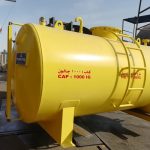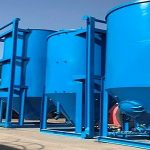Fire Water Tank Manufacturer and Supplier in Saudi Arabia
As Saudi Arabia continues to develop its industrial sectors, urban infrastructure, and safety standards, the demand for fire water tanks is set to grow exponentially. By 2030, the fire water tank manufacturing industry will evolve in response to the rapid pace of technological advancements, stricter safety regulations, and an increasing focus on sustainability. As fire safety becomes a priority in construction, industrial applications, and residential complexes, the future trends in fire water tank manufacturing will redefine how these systems are built and maintained. In this blog, we explore the predicted future trends for fire water tank manufacturers and suppliers in Saudi Arabia and the advantages these changes bring.
1. Smart Fire Water Tanks with IoT Integration
One of the most significant technological trends anticipated in fire water tank manufacturing by 2030 is the rise of smart fire water tanks equipped with IoT (Internet of Things) technology. These tanks will feature real-time monitoring systems, which will allow users to track vital parameters like water levels, temperature, pressure, and integrity.
With IoT-enabled systems, fire water tanks will be connected to a central system that can provide early warning alerts in case of leaks, malfunctions, or low water levels, ensuring better preparation for fire emergencies. Predictive maintenance features will allow operators to schedule maintenance or repairs proactively, preventing costly system failures. This innovation not only enhances safety but also streamlines the management of fire water systems, reducing the time and cost associated with traditional manual inspections.
2. Sustainability and Eco-friendly Manufacturing Practices
In the near future, sustainability will be at the core of the fire water tank manufacturing process in Saudi Arabia. By 2030, manufacturers will shift to eco-friendly materials and green technologies that help reduce the environmental impact of production and usage. Fire water tanks will be made from recyclable steel and corrosion-resistant coatings that are long-lasting and environmentally safe.
Additionally, rainwater harvesting systems will be incorporated into the designs of these tanks. This will allow them to serve a dual purpose—storing fire water while also contributing to water conservation efforts. By reducing reliance on freshwater sources, businesses and municipalities can promote sustainable practices while still maintaining optimal fire safety systems.
3. Modular Fire Water Tanks for Flexibility and Scalability
The need for customization and flexibility in fire water tank systems will increase in Saudi Arabia by 2030. Modular fire water tanks will become more common, allowing users to scale the system according to the size of the property or project. Modular tanks consist of interlocking units that can be expanded or reduced based on the user’s needs. This offers a cost-effective solution for fire safety in both residential and industrial applications.
The modular design also allows for easier transportation, installation, and maintenance, making it an ideal option for large-scale projects, especially in remote or hard-to-reach locations. Whether a business needs to add more storage capacity in the future or relocate the system to a different location, modular tanks will provide the necessary flexibility.
4. Advanced Fire Water Tank Coatings and Durability
Corrosion and weather conditions are major challenges for fire water tanks, particularly in Saudi Arabia’s extreme temperatures and high humidity. By 2030, advanced coatings and corrosion-resistant materials will be more widely adopted. These new coatings, such as epoxy coatings, polyurethane finishes, and galvanized steel, will enhance the durability and lifespan of fire water tanks, ensuring that they can withstand harsh environments without deteriorating.
Additionally, innovations in UV-resistant and heat-insulating materials will be incorporated to protect the tank from extreme temperatures, preventing the risk of fire water becoming ineffective in an emergency. With these advancements, fire water tanks will require less maintenance and have a longer service life, providing significant cost savings over time.
5. Compliance with International Standards and Regulations
As fire safety regulations become stricter, manufacturers will have to ensure that fire water tanks meet global compliance standards. By 2030, fire water tanks in Saudi Arabia will not only need to comply with local standards set by the Saudi Arabian Standards Organization (SASO) but also meet international safety and quality regulations such as those set by NFPA (National Fire Protection Association), BSI (British Standards Institution), and UL (Underwriters Laboratories).
Adherence to these stringent standards will ensure that fire water tanks are not only safe but also reliable and efficient in the event of an emergency. Manufacturers that offer products meeting international compliance standards will have a competitive edge in the marketplace, ensuring both the safety of users and legal compliance.
6. Automation and Robotic Maintenance
As we approach 2030, automation will become increasingly integrated into fire water tank manufacturing and maintenance. Robotic systems will take over tasks such as cleaning, inspection, and refilling, reducing human error and increasing efficiency. Automated cleaning systems will help maintain water quality, ensuring that the tank remains ready for immediate use in case of a fire.
Automation will also extend to the installation process, where robots can assist with setting up large tanks in difficult-to-access areas. These advancements will significantly reduce the labor costs and time required for maintenance and tank management, increasing operational efficiency.
Benefits to Customers by 2030
These future trends in fire water tank manufacturing will benefit customers in several ways:
- Enhanced Safety: With smart technology, predictive maintenance, and advanced coatings, fire water tanks will be more reliable and responsive to fire emergencies.
- Cost Efficiency: Modular designs, automated maintenance, and the use of sustainable materials will reduce installation and maintenance costs over time.
- Environmental Responsibility: Sustainable manufacturing practices and rainwater harvesting systems will align with global efforts to conserve water resources and reduce environmental footprints.
- Compliance and Peace of Mind: Customers will benefit from knowing that their fire water tanks meet global safety standards, ensuring their fire safety systems are compliant and effective.
Conclusion
As Saudi Arabia continues to expand and evolve, the demand for high-quality, reliable fire water tanks will only increase. The trends predicted for 2030, such as smart technology integration, eco-friendly manufacturing, and modular designs, will reshape the fire water tank industry and provide businesses, industries, and municipalities with safer, more efficient, and cost-effective solutions.
By embracing these innovations, Cochin Steel Arabia is committed to delivering advanced fire water tanks that meet the future needs of our customers, ensuring the highest levels of safety and reliability.
Contact Cochin Steel Arabia
For more information on our fire water tank solutions or to request a quote, contact us today!
Phone: +966 541675501
Email: info@cochinsteelarabia.com
Website: www.cochinsteelarabia.com




